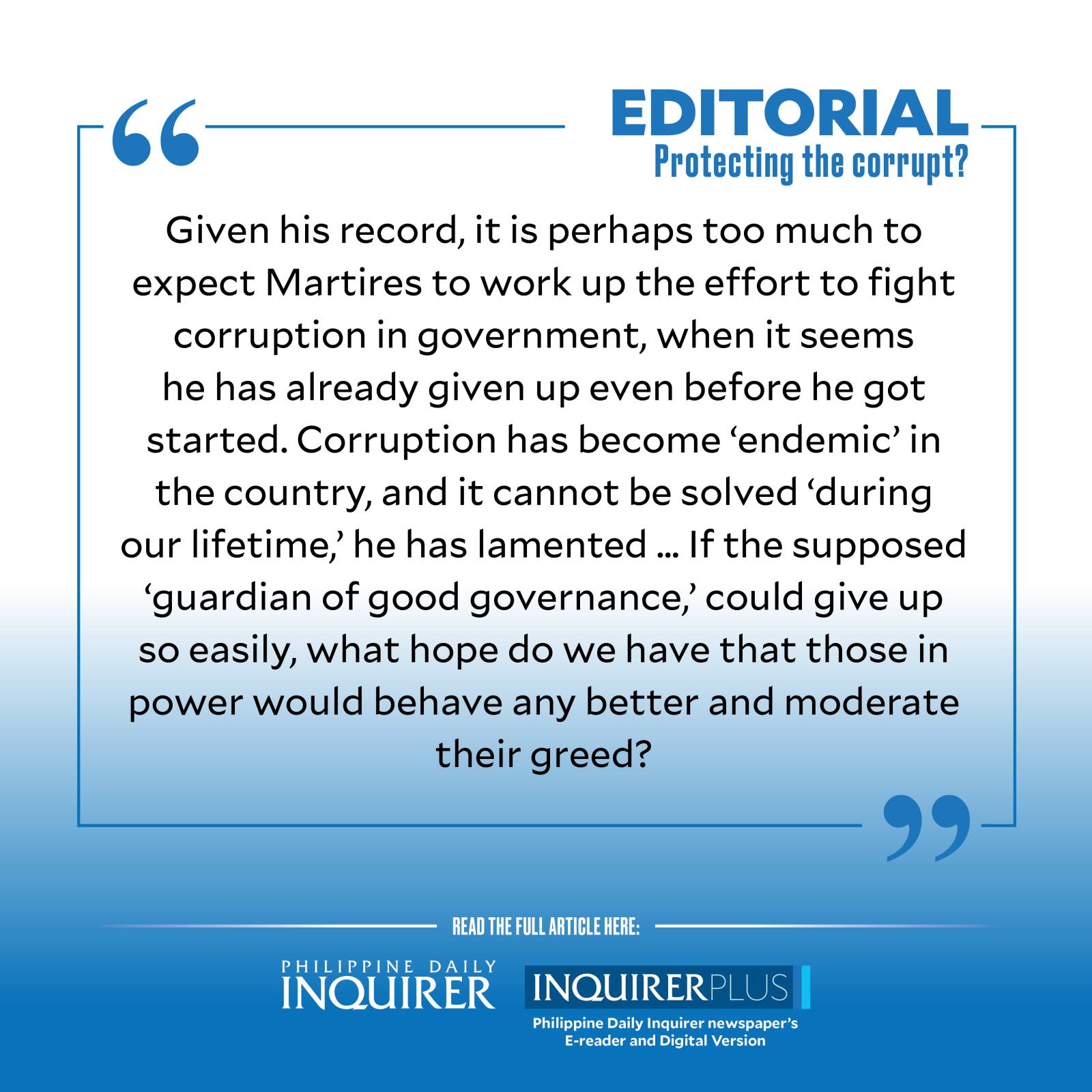Protecting the corrupt?
It is the ultimate irony that the Ombudsman, whose sworn duty it is to help keep government officials in line, has seemingly been intent on doing away with legal measures put in place to weed out the corrupt, and has instead made it easier for the unscrupulous to hide their dirty deed.
On Monday, people were taken aback when Ombudsman Samuel Martires suggested that Congress drop a provision in the annual national budget requiring the publication of Commission on Audit (COA) reports on government agencies. The published reports, Martires averred, were “causing confusion” and could prompt the public to prejudge as guilty those flagged by the state auditing agency. Martires faced members of the House appropriations panel during the presentation of the Office of the Ombudsman’s proposed P4.98-billion budget for 2024.
Article continues after this advertisementUnder the General Appropriations Act, which details how the annual budget is supposed to be spent, government agencies are required to publish on their website their annual reports, audited financial statements, and COA reports—to which they have 60 days to comment on should the audit agency find irregularities. The COA reports are a crucial tool in the fight against corruption in government, as they detail how public funds and property are used—or misused—by the respective agencies and government-owned and -controlled corporations.
House Deputy Minority Leader Rep. France Castro pointed out that publishing COA reports is “just one of the very few ways that the public can check if their hard-earned money is used properly.” Like the publication of the statement of assets, liabilities, and net worth (SALNs) of public officials, the audit observation memorandum is part of the mechanisms for transparency and accountability for public officials, Castro said.
Stung perhaps by public backlash, the Office of the Ombudsman issued a statement yesterday saying it was “not protecting erring and corrupt government officials and employees” with Martires’ proposal.
Article continues after this advertisementBut Ibon Foundation executive director Sonny Africa noted that Martires has been “consistent” in “reducing transparency” in government, contrary to his mandate as supposedly the country’s top graft buster.
Recall that during the budget hearings in 2021, the sixth Ombudsman of the Philippines pushed for tough penalties, including five years in jail, for anyone who commented on the SALN of government employees, saying that this necessary document had been “weaponized” and were being used to destroy reputations. The year prior, Martires set strict conditions and excluded media from the list of those who may be granted access to the document. This, despite the fact that the filing of SALNs is required under Republic Act No. 6713, with the Ombudsman considered the custodian of the documents, particularly those of the President, Vice President, senior officials, and star-rank military and police officers, under the principle that these documents should be open to all Filipinos, since “public office is a public trust.”
Martires also admitted that his office had not done any lifestyle checks since he was appointed by former president Rodrigo Duterte in July 2018, saying that the law establishing a code of conduct and ethical standards for public officials had “confusing” and “illogical” provisions.
Despite a 2015 joint circular that clearly spelled out guidelines on the release, use, reporting, and auditing of confidential and intelligence funds that could wind up as slush funds, Martires has said that there was no need for his office to account for confidential funds. By extension, neither do other government agencies which can instead issue a mere certification that the money was used properly.
Such touching faith in the sterling goodness of government officials might explain the steep decline in the conviction rate of the Office of the Ombudsman, as pointed out by Batangas Rep. Gerville Luistro. From 61.2 percent in 2020, the conviction rate dove to 42.7 percent in 2021, and to a mere 26.5 percent in 2022. Blame the amended jurisdiction of the Sandiganbayan for the lower conviction rate, Martires said, adding that such figure was an “unfair” yardstick to measure their competence.
Given his record, it is perhaps too much to expect Martires to work up the effort to fight corruption in government, when it seems he has already given up even before he got started. Corruption has become “endemic” in the country, and it cannot be solved “during our lifetime,” he has lamented. Fighting it, he said, will require not the enforcement of laws already in place, but the passage of a new law that would mandate the teaching of “God-centered” good manners and right conduct.
If the supposed “guardian of good governance,” could give up so easily, what hope do we have that those in power would behave any better and moderate their greed?
















